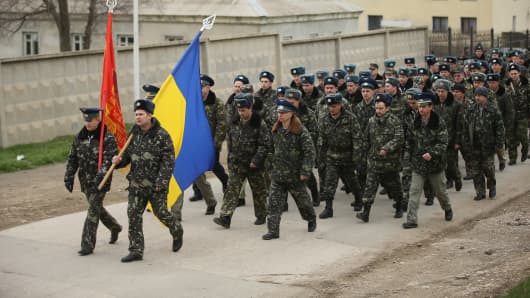And it is even more surprising that, in spite of this, the "international community" expects China and Russia to cooperate in the political settlement of (a) the war-ravaged Syria, (b) the seemingly insoluble Arab-Israeli conflict, (c) Iran's suspected nuclear ambitions, (d) the volatile inter-Korean relations, (e) the post-NATO Afghanistan and (f) the factions-torn, proxy wars in the bombed out Iraq.
That is an explosive agenda for what Russians strangely call "partners" – people pretending that the guns they have pointed at each others' temples are full of blanks.
But countries spoiling for massive sanctions – as now seems to be the case -- are not firing blanks. To paraphrase the Prussian general von Clausewitz, sanctions, stock market and currency attacks are warfare by other means.
Investment implications
Investors have to realize that in that kind of hostile world Rummy's "stuff" can easily happen. And one does not have to be paranoid to think that Ibsen's earlier quoted line clearly alludes to such a possibility.
(Read more: Crimea votes to join Russia, Obama orders sanctions)
So, what are investors to do?
The safest first principle could be: Stay local as much as possible.
But watch the fallout from sanctions and martial games. If (admittedly a big "if") the reason prevails, your equity portfolio may still benefit from the expansionary monetary policies in the U.S., the euro area and China.
Blanket statement to stay away from fixed-income instruments may no longer apply for sanctions-distorted financial markets. In such a fragmented world, good quality bonds, if you can find any, could be part of a temporary flight to safety.
I also wish to repeat my positive outlook for gold. Having read so far, you might guess that my optimism about the yellow metal is based on growing geopolitical instabilities.
Energy prices could also shoot up. Ukraine has already practically defaulted on $1.89 billion it owes to Russia's Gazprom. The huge pipeline system running through Ukraine could soon be shut down to leave the Central Europe in a deep freeze, as was the case for 20 days in the early months of 2009.
Michael Ivanovitch is president of MSI Global, a New York-based economic research company. He also served as a senior economist at the OECD in Paris, international economist at the Federal Reserve Bank of New York and taught economics at Columbia.
Follow the author on Twitter @msiglobal9






